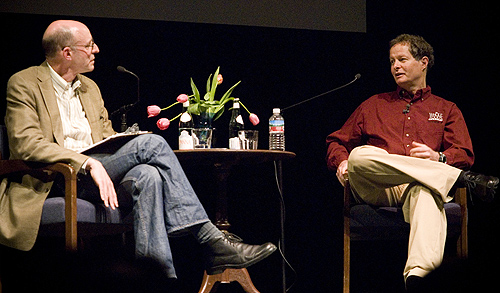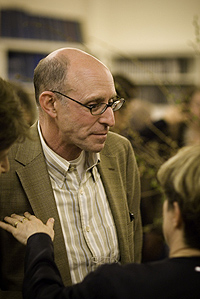Berkeleyan
 Journalism professor (and Omnivore's Dilemma author) Michael Pollan, left, considered a point made by Whole Foods CEO John Mackey at last week's well-attended discussion on the future of organic food. (Bart Nagel photos) |
Berkeley foodies enter 'the ecological era'
It may not have been the 'smackdown' that the growing cadre of food-politics activists anticipated, but there were still sparks - and insights - aplenty at last week's Whole Foods/Omnivore talkfest
![]()
| 07 March 2007
Why on earth would 2,000 people turn out on a rainy, blustery evening to hear a conversation between a reporter and a grocer? asked the former of the latter in a sold-out Zellerbach Hall on Tuesday, Feb. 27.
The answer has two parts. The speakers were not just any reporter or grocer, but Michael Pollan, best-selling science writer and Knight Professor of Journalism here, and John Mackey, founder and CEO of Whole Foods Market, the world's largest natural-foods grocery chain. And they have been carrying on a dialogue of sorts about the future of organic food ever since the publication last April of The Omnivore's Dilemma, Pollan's investigation into the U.S. food chain, excerpts from which have appeared widely in venues such as The New York Times Magazine, Mother Jones, and Salon.com.
In a chapter titled "Big Organic," Pollan wrote "a few slightly unflattering things" about Whole Foods, he told the Berkeley audience - somewhat of an understatement. Stung by Pollan's criticism, Mackey replied with a 25-page, single-spaced letter, kicking off an exchange of messages posted online at www.wholefoods.com/blogs/jm.
Pollan invited Mackey to come to Berkeley to continue the conversation in public. To which Mackey replied, in effect, "How crazy do you think I am?" recalled Pollan, alluding to Berkeley's notoriously opinionated, anti-corporate contingent of "foodies." But in the end Mackey agreed, which Pollan said showed a "willingness to engage with his critics [that] sets him apart from just about every other CEO."
Mackey suggested that Tuesday's large and eager crowd was a result of the food-reform movement reaching a "tipping point, a critical consciousness level" that is both rapidly accelerating its growth and causing its ideology to fracture. Pollan's "brilliant" book, as Mackey called it repeatedly, is both a product of and a catalyst for that movement, whose early adopters included California's "back to the land" hippies, the 1969 garden-planting rebels of Berkeley's People's Park, and local- and seasonal-food promoter Alice Waters, Cal class of '67 and the founder of Chez Panisse. Many of these pivotal figures were in the audience, among them Waters and Bill Niman, whose humanely raised meat business, Niman Ranch, was built in the '70s with the assistance of Berkeley journalism dean Orville Schell.
For the CEO, a considerable challenge
The evening was billed as "The Past, Present, and Future of Food," in honor of Mackey's presentation tracing humanity's relationship to food from the hunter-gatherer era to the dawning of what he calls the "ecological era." In this new era, Mackey believes increasing numbers of consumers will reject the industrial values of high productivity and low commodity prices in favor of foods that are natural (not processed, and without synthetic additives), organic, local, and ethically and sustainably raised and traded.
Mackey's considerable challenge was to persuade Pollan and a skeptical audience that the company he founded in the '70s as Safer Way - and that he has patiently grown into a $5.6 billion-a-year, Fortune 500 business - still has the credibility and integrity to lead the food movement into this future.
As Mackey said in an interview on the Marketplace pubic-radio program the day before the event, there's always been an ongoing battle in organics between what he called "the purists and the pragmatists." Pragmatists like him "want to spread organics to as many people as possible," a growth strategy that often requires compromise, while "the purists are very mistrustful of it being corrupted by agribusiness and big corporations."
When Mackey asked how many in Zellerbach Hall had read The Omnivore's Dilemma, two out of three people raised their hands. Eleven months after its release, it has sold 174,000 copies, according to Bookscan. Pollan's views on Whole Foods thus spread like canola seed through the consciousness of the very people most likely to shop there.
 Increasingly well-known for his writing on the politics of food, Pollan was sought out at the Zellerbach event by Alice Waters, as thoroughly identified with the fresh-and-local-food movement for decades as Pollan is now. |
Pollan wrote about the frequent cognitive dissonance he experienced as a Whole Foods shopper, between the in-store signage and literature trumpeting small family farms (a genre he dubbed "Supermarket Pastoral") and the reality of the large, corporate, industrial farms that he determined made up most of Whole Foods' suppliers.
"[T]o the extent that the organic movement was conceived as a critique of industrial values, surely there comes a point when the process of industrialization will cost organic its soul," he wrote.
Since he had used 450 pages to present his take on the state of the food system, Pollan explained, he thought Mackey deserved a fair chance to present his. The Whole Foods CEO did so with a 45-minute lecture comprising dozens of slides crammed with text and graphs, racing though the slides like a Ph.D. candidate presenting his dissertation. He traced the history of humanity's agricultural development from hunting and gathering (by far the longest-lasting era), to horticultural (planting fruits and vegetables), pastoral (raising animals for food), pre-industrial (in which slave labor permitted the growing of monocultures), and the present-day industrial era (in which machines, chemicals, and new technology have largely replaced human labor).
Some inconvenient truths about our food system
Industrial agriculture is primarily focused on increasing productivity and lowering costs, and "it's been amazingly successful," said Mackey. The system's major drawbacks are that it recognizes no values beyond those two, yet it has taken an enormously destructive toll on society: polluting the environment, guzzling fossil fuels, making Americans fat, and giving so many antibiotics to animals that the drugs' efficacy in treating humans is diminished. (It has also resulted in inhumane treatment of farm animals that borders on the barbaric.)
Mackey then attempted to cheer up the audience with positive changes that the ecological era might usher in as it attempts to correct the failings of the industrial era. Although Whole Foods almost singlehandedly developed the mass market for organic food, he said the company recognizes that organic no longer means what it originally did to consumers, and thus plans to lead the charge into the next phase, or "beyond organic." The beyond-organic buzzwords: local, ethical, sustainable, and humane.
Whole Foods already has an Authentic Food Artisan program through which individual stores can recognize small producers in their communities. Among the new initiatives that Mackey announced in his Berkeley appearance is a $30 million venture-capital fund that Whole Foods will use to invest in small artisans producing unique regional foods. By helping the artisans preserve their traditions while accessing a global market, the fund would follow in the footsteps of the Slow Food movement started in Italy during the '80s.
In the next year, Mackey said, Whole Foods will also develop a tiered rating system for organic farms and meat producers. Simply meeting the USDA's certified-organic criteria would earn one star, but "practicing the highest levels of agroecological principles - you've got the healthiest soil, your workers are well-treated, you've got exemplary animal-welfare standards" - could earn five stars, he explained. The program would be administered by the same third-party organic certifiers who already vet the farms' practices, and he hopes it will branch out from Whole Foods to become a national system.
Under another new initiative, the Whole Trade Guarantee, Whole Foods would partner with Fair Trade and the Rainforest Alliance to evaluate the quality, price, labor practices, and environmental sustainability of imported foods. While the label initially will cover coffee, bananas, tea, chocolate, mangoes, rice, and pineapple, Mackey aims to have 50 percent of the chain's products from the developing world sold under the Whole Trade Guarantee within 10 years.
Mackey concluded his presentation with a plea for open-mindedness about food. First order of business: Stop romanticizing the past and recognize that "there was never a 'golden age' [of food] - they all had their problems," he said. He also implored the audience to avoid thinking of agriculture and food in simplistic terms of "good guys and bad guys."
"Look," he said, "Whole Foods has been doing this for 27, 28 years now, and we're going to keep doing this. The challenge I would put out to everybody here is, What are you going to do? What's your contribution going to be to help our planet evolve into the ecological era?"
'Thanks to you, buddy!'
What followed was frank talk about how Whole Foods' success had made the company "a lightning rod" for criticism about the organic-food industry. "Do you worry that organic has suffered a crisis of consumer confidence?" Pollan asked.
"Yeah, thanks to you, buddy!" pounced Mackey. He was joking, but his subsequent remarks showed just how deeply he felt the bolts of criticism Pollan had directed his way. Pollan's intentions were good, Mackey said, "and some of that truth needs to be heard. But . you exaggerated the extent of the industrialization of organic. Everyplace I turn I read about 'Big Organic' and 'Industrial Organic.' While I don't deny that there's some of that going on, I don't think it's the normal state of affairs. I'm not ready to abandon organic as fatally flawed."
Turning the tables, Mackey asked Pollan for his vision of what changes should be made in the food system, and argued that The Omnivore's Dilemma had made already complex food choices more confusing.
"That was one of my goals, to complicate the decision," admitted Pollan. "Because right now, the decision is too simple for most Americans. For the people in this room who struggle with local versus organic, or imported versus local, or humane versus being vegan, those are really hard, legitimate questions, and anyone who's struggling with them is halfway there..I'm less interested in sending people down particular paths than in just making them think."

